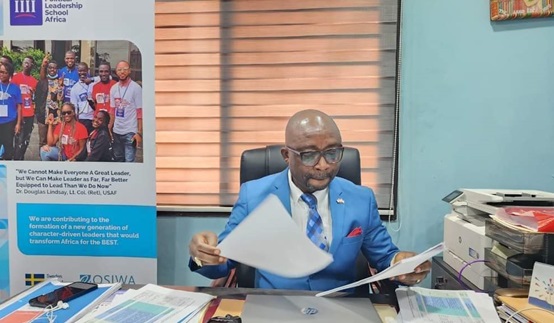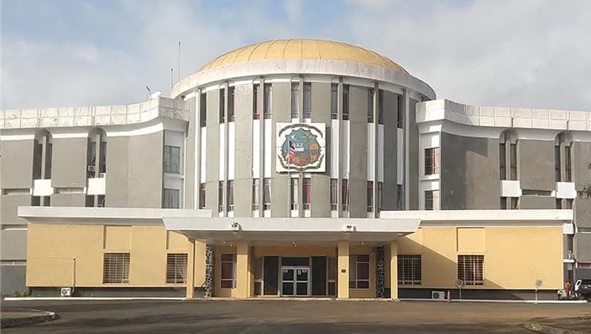MONROVIA, LIBERIA – The National Road Fund (NRF) Manager, Joseta Neufville-Wento, is facing intense scrutiny after vocal activist Martin Kollie exposed what he describes as a “cunningly orchestrated scam” involving US$410,500 meant for a “road review” project. Kollie, in a scathing exposé released on February 13, 2025, has highlighted serious legal and financial violations, calling for full accountability. “The facts are clear, and the evidence speaks for itself. US$410,500 was dished out without a single piece of meaningful work being done. This was not about reviewing roads; this was about stealing from the Liberian people,” Kollie asserts.
Kollie points out that under the Public Procurement and Concessions Commission (PPCC) Law, contracts exceeding US$250,000 must undergo competitive bidding. However, in this case, there was no competitive process to award the contract. “This contract was nothing but a premeditated attempt to rob Liberia. No bidding, no transparency, and no accountability. It’s a flagrant violation of the law,” Kollie stated, making it clear that the absence of due process raises suspicions of a deliberate attempt to funnel money away from vital public projects.
According to Kollie, Neufville-Wento signed the contract with Bleco Group on August 18, 2023, and then retroactively sought approval from the PPCC on August 30, 2023. “This is corruption at its finest. Joseta Neufville-Wento entered into an agreement with Bleco Group, and then ran to the PPCC asking for their ‘No Objection,’ after the deal was already made. Is this not a clear case of wrongdoing?” Kollie asks, accusing Neufville-Wento of manipulating the process to bypass regulatory oversight.
The controversy deepens with allegations that 60% of the contract amount was paid upfront to Bleco Group, a company with no apparent expertise in road construction. Kollie exclaims, “How do you justify paying a contractor 60% of their fees before even starting work? This is a textbook example of corruption. There is no accountability, no checks, and no regard for fiscal prudence.” He argues that the entire arrangement lacks any logical justification, especially in a country where basic infrastructure, like roads, is in dire need of repair.
The contract, which was supposed to be for a “road review,” raises serious questions. Kollie asks, “What roads were they reviewing? In a country where potholes litter even the capital city, Monrovia, why would anyone spend over US$400K just to ‘review’ roads? It doesn’t make sense. This was never about fixing roads, it was about stealing from the public purse.”
Bleco Group, the company at the heart of this scandal, has been described as a corporate entity with no previous history in road construction or any relevant engineering services. Kollie challenges the legitimacy of Bleco Group’s involvement in the project: “Bleco Group’s main business is cargo handling, not road construction. This company has no technical capacity to undertake any road-related work. Their Articles of Incorporation don’t mention anything about roads, civil engineering, or infrastructure work. So, how did they secure this contract? It’s a scam.”
Engineer Titus A. Thomas, a technical consultant for NRF, further corroborates Kollie’s claims, stating that Bleco Group did not perform any work despite receiving the full contract sum. “They had no capacity to do the work. I advised Joseta Neufville-Wento multiple times not to proceed, but she ignored all warnings,” said Thomas in an interview. Kollie highlights Thomas’ testimony as further evidence of the fraudulent nature of the contract. “The evidence is damning. Bleco Group did not deliver any work but was paid US$410,500. That money should never have left the Treasury.”
The scandal is compounded by the involvement of Terrentius Collins, one of Bleco Group’s key figures. Collins, a controversial business figure with a history of legal issues, including illegal timber trade and sand mining, is described by Kollie as an integral player in the scam. “Terrentius Collins is a known criminal involved in illegal timber trafficking and sand mining. This man is one of the key players behind this fraudulent scheme, yet he’s allowed to operate freely. The government must hold him accountable,” Kollie demands.
Kollie also accuses Neufville-Wento and others involved in the contract of deliberately inflating the costs and misappropriating funds. “This is not just a case of poor judgment; this is a calculated attempt to siphon off public money. We know how the money was shared. We know the corrupt actors behind this scandal. They thought they could get away with it, but we’re exposing everything,” Kollie declared, promising to release further evidence in the coming days, including fake project reports, emails, and financial documents.
As the scandal continues to unfold, Kollie is calling for immediate action. “We demand a full investigation by the Liberia Anti-Corruption Commission (LACC). President Boakai must suspend Joseta Neufville-Wento and turn her over for criminal investigation and prosecution,” Kollie stated. He also criticized attempts to discredit his work, challenging his detractors to prove their accusations. “Whenever we expose corruption, they claim we have a ‘paymaster’ or that we’re blackmailers. Let them prove it. We have no paymaster. Our only allegiance is to the Liberian people.”
Kollie’s unflinching stance on corruption is clear. “We’ve been doing this work consistently for years, under Presidents Sirleaf, Weah, and now under Boakai. Our mission hasn’t changed: we are fighting for our people and our country. Corruption has held us back long enough. We will pursue every thief who steals from Liberia’s future,” he said, reinforcing his commitment to exposing corruption at all levels of government.
In conclusion, Kollie’s investigation into the US$410,500 road review contract represents just one example of the systemic corruption that plagues Liberia. The facts are irrefutable, and the public deserves answers. As Kollie demands accountability, it remains to be seen whether the government will take meaningful action to address this egregious misuse of public funds.







